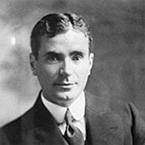
The youngest of the AACR founders, George H. A. Clowes was only 29 years old in 1907. Among the many positions Dr. Clowes held in the association over the years was the presidency in 1938. During his tenure AACR explored establishing branch societies, took steps toward eventual incorporation, and reiterated its support for the American Journal of Cancer (now Cancer Research) by passing a motion to express the strong belief that a journal is essential to research.
Dr. Clowes was born in Ipswich, England, graduated from the Royal College of Science in London in 1896, and earned his doctorate in chemistry from the University of Göttingen, Germany, in 1899. After six months of postgraduate work at the Sorbonne, he moved in 1901 to the New York State Institute for the Study of Malignant Diseases. There he established a strain of tumors for testing chemotherapies. He also observed spontaneous regression of tumors in rats, which led him to search for an antigen to confer immunity against cancer. He is credited with establishing the viability of chemotherapy in his early studies in 1904.
After several years in Washington D.C., in 1919 Dr. Clowes joined the Eli Lilly Research Laboratory in Indianapolis, Indiana, as a research biochemist. Two years later, he became director, a post he held for 25 years. He continued as consultant to Lilly until his death. Dr. Clowes is best remembered for his crucial role in bringing insulin to millions of diabetics worldwide. After hearing Canadian researcher Frederick G. Banting present his research on insulin, Dr. Clowes became an enthusiastic supporter, and in 1922, Lilly negotiated an agreement with the University of Toronto for the rights to mass produce insulin for the U. S. market. Lilly then manufactured and marketed insulin in record time, despite logistical and technical obstacles that included a temporary federal order forbidding the use of pure alcohol in the company’s research, an effect of Prohibition. To obtain insulin from pig pancreases meant negotiating a long-term supply contract with a Chicago meat-packing company. In 1923, Lilly began selling the first commercially available insulin in the United States, under the trade name Iletin.
Dr. Clowes continued doing cancer research throughout his life, maintaining a laboratory in Woods Hole, Massachusetts, for over 40 years. In 1961, the Eli Lilly Company joined AACR to establish the annual G.H.A. Clowes Memorial Award in his honor, the first award ever given by the association. Five of the past winners have gone on to win the Nobel Prize in Physiology or Medicine. At Dr. Clowes’ death, the Indiana Academy of Science noted that his ”permanent monument will be his outstanding service to humanity and his fellow citizens.”